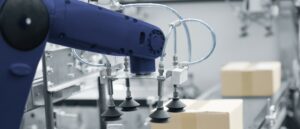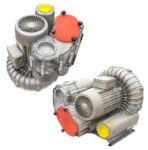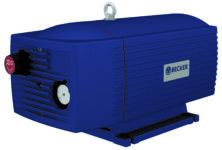
The use of compact, powerful, and ever-more-efficient vacuum pumps for maple syrup production is changing the sugaring industry. Let’s look at whether the new generation of smaller, smarter vacuum pumps for sap production is worth paying a little more for up front.
SMART SUCKERS: HOW NEW PUMPS CHANGE THE COST EQUATION FOR MAPLE SYRUP FARMERS
Until recently, investing in a vacuum pump to boost sap production at your sugaring operation meant betting the farm on expensive, hard-to-maintain, and potentially unreliable equipment. Now, efficient new pump technology is allowing even smaller producers to lengthen their season and open up new sugarbush terrain with affordable, reliable vacuum-driven sap collection.
Here’s what makes the new pumps different and how that changes the traditional cost tradeoffs in the industry.
PUMP TECHNOLOGY
New pumping and lubrication technology plus smarter design from leading manufacturers like Becker Pumps is making equipment investments less risky.
SMARTER MOTORS
More and more pumps are using high-efficiency, variable frequency drive (VFD) technology to provide power when it’s needed, rather than less responsive legacy electrical or even gas-powered motors.
PUMPED UP
Rotary claw, rotary vane, and now rotary screw pump technology offer more direct, continuous power with better compression than older hook and claw or other pump designs.
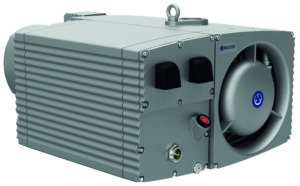
SLICKER LUBRICATION
Modern oil-flooded pumps are ideal for maple sugaring, maintaining stronger vacuum in rotary vane designs, and protecting better against the high water vapor content in sap than oil-free or conventionally lubricated pumps.
BETTER MOISTURE PROTECTION
Leading manufacturers are also building better moisture control technology into their pumps. OEMs like Becker Pumps now offer sugaring-friendly features on many models, including:
- Gas ballast valves to automatically vent excess water vapor
- High-efficiency and dual-stage oil separators to combat liquid water
- Oil-cooled units for cold-weather operation.
RIGHT-SIZED CAPACITY
More real horsepower matched with smaller pump inlet sizes means more usable vacuum suction for your gathering system.
RETURN ON INVESTMENT
That said, what do these new pump technologies and sap-friendly features really have to offer smaller producers or established players hoping to build scale and efficiency?
MORE POWER
More horsepower for your tube gauge means more power at every tap and opening up new, previously inaccessible sugarbush. Increased power also allows you to pull more sugar during thaw events and keep sap flowing for longer. And that means a longer, more productive season.
MORE EFFICIENCY
Smarter electrical motors mean less power costs and more suction for your available horsepower. Widely available VFD technology lets your pump pull power only when it needs it, and that delivers a lower power bill during peak demand season.
LESS MAINTENANCE
Better moisture protection, solid-state design, and improved cold weather performance reduce the amount of on-site maintenance your pumps will need, with most upkeep taking place at the end of the season. More consistent pressure also means less clogging, staining, and better overall tap and tube hygiene.
LESS LABOR
Maple sugaring is a labor-intensive industry. Better flows, more consistent suction, fewer sub-branches and the right amount of vacuum for your tubing means less time tracing and plugging leaks. Add that to more steady, consistent flows during thaws and less time maintaining your pumps and you could be looking at serious savings.
LONGER EQUIPMENT LIFE
Simplified design, an efficient VFD motor, consistent flows, better moisture handling, and improved cold weather performance all point to a far longer use-life for a slightly larger outlay on quality vacuum pump design.
Taken together, these factors all point to significant benefits over time for those choosing quality vacuum pumps designed with maple sugar extraction in mind.
THE (NOT SO) LONG VIEW
Traditionally, the long-term benefits of higher-quality, more efficient pumps would benefit established producers first because they would be in the best position to reap the rewards at the scale of lower power, maintenance, and labor costs.
The ability of the smaller, lower-cost pumps to deliver significantly more vacuum changes that. It allows smaller producers to significantly increase yield without the higher operating costs usually associated with larger, more powerful pumps.
Introducing vacuum to a traditional gravity-fed gathering system is widely estimated to boost the yield of a sugarbush by 50-200%.
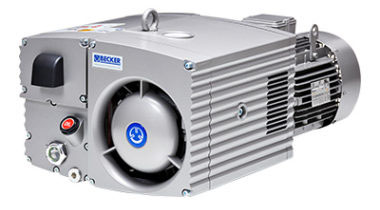
Add to that recent research by agricultural scientists at the University of Vermont that found sap yield increased by 5-7% for every additional inch of mercury pressure—and it’s clear the old economics of the sugaring industry is breaking down.
What’s more, modern vacuum pumps include built-in features designed to address challenges traditionally with introducing high vacuum to a gathering system, including:
- Taphole staining and blocking, and reduced tap life
- Tubing leaks and air blocks
- Pump exposure to water vapor and sap
- Higher power consumption
MORE BANG, LESS BUCK
The real game-changer, however, is that increases in performance, efficiency, and durability are being delivered at a lower unit cost. While you will still pay a little more for a high-quality vacuum pump, you’ll get more power, durability, and efficiency than ever before.
That means a shorter return on your investment in sap vacuum power, whether you’re an established player, a small-scale farmer, or an industry entrant.
Even state, local, and industry bodies are starting to recognize the real gains in efficiency that vacuum pump technology now offers. Some, like Efficiency Vermont, offer rebates on purchases of VFD-equipped vacuum pumps like Becker Pumps’ U Series rotary vane units.
That’s just one more reason why, technologically speaking, it’s never been a better time to tap into the power and efficiency of vacuum-powered maple sugar extraction!
TAP IT RIGHT, MAKE IT BECKER
Becker Pumps’ U Series oil-filled rotary vane vacuum pumps are designed to provide robust, efficient vacuum power and advanced moisture protection—making them perfect for maple syrup extraction operations of all sizes.
Fully lubricated pumps are suitable for season-long outdoor operation and offer unparalleled cold start performance. They’re also capable of running on either single-phase or three-phase power to maximize sap yield while minimizing cost.
With vacuum pressures up to 29 Hg and inlet sizes between 0.5 and 3 inches, there’s a pump right-sized for your pocket and terrain. Our pumps also feature:
- High-efficiency IE3 motors
- Dual stage oil separation
- Available gas ballast vapor venting valves
Built for years of efficient operation and once-in-a-season maintenance, U Series pumps are ideal for established industry players, small-scale operators, and entry-level farmers. Whether you’re running 400 taps or 40,000—Becker vacuum pumps will help keep your sap flowing faster and longer when it counts. Click below to learn more.

